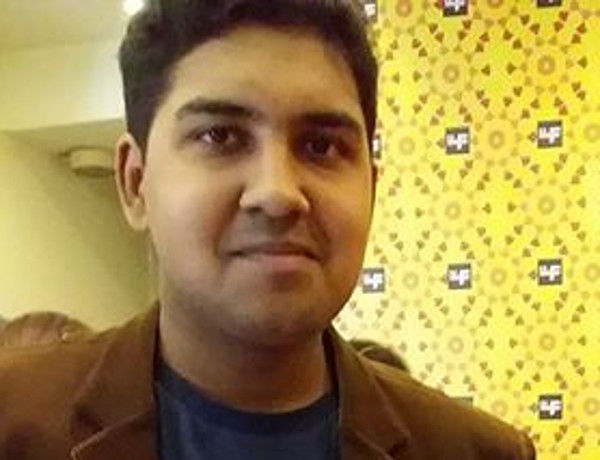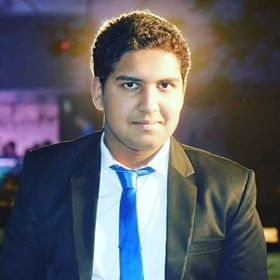A Pakistani Dreams of Israel
- Sarmad Iqbal
- Apr 14, 2018
- 4 min read

Sarmad Iqbal (Image credit: PR Photo)
Despite the fact that I live in a country where people almost consider it a religious obligation to spew odium of all sorts against Israel and everything related to the Jewish state, I have triumphantly mustered up enough courage to pen this article out of my fascination for different facets of the country of Israel. Israel is not often seen in a positive light in my country of Pakistan. It is thought of as a state that conspires against every predominantly Muslim country as well as each and every Muslim living on this planet, through some “secret machinations.” These are so “secret” that I am sure Israelis and Jews are not aware of them. I have always been vehemently opposed to the anti-Semitic propaganda that my fellow countrymen have tried to feed into my mind. I have been quite rebellious in disagreeing with them over labeling all Jews and all Israelis as “bad guys.” Israel is portrayed with a biased, one-dimensional image by Arab, Iranian, and Pakistani media, usually as a country always engaged in some conflict with the “Islamic brothers” of Pakistan (Arabs and Iranians), or as a country that takes sheer “delight” in bombing “Islamic” cities like Beirut and Gaza. These futile efforts of my fellow countrymen to instill animosity for Israel instead resulted in my increasing curiosity to explore what Israel really is. I learned about Israeli culture and society through Israeli movies like “The House on Chelouche Street” and the “Lemon Popsicle” trilogy, the songs of divas like Shiri Maimon and Sarit Hadad, and TV shows like The X Factor Israel. I studied the history and learned how less than 24 hours after the State of Israel was proclaimed in May 1948, it was assailed by the regular armies of five Arab countries, forcing it to safeguard the sovereignty it had salvaged in the Jewish people’s ancestral homeland. The fledgling state had a population of some 650,000, while millions of European Jews (survivors of the Nazi Holocaust) and Jews living in Arab countries in the Middle East and North Africa (from Yemen to Morocco) waited to immigrate. Considering the struggle for survival Israel faced and the exigency for provision of the fundamental needs of a population that tripled itself in a decade, it was quite arduous to think that Israel would prosper economically. That it would ever be able to have any sort of political clout in the Middle East. Now, however, that is a reality (a bitter one for the foes of Israel) and no one can deny it. Today, the increasing military and politico-economic might of Israel cannot be denied by anyone with eyes in their head. I was amazed how Israel, a tiny country one can barely see on the world map, possesses an energy within its small geographical area that distinguishes her from all the other countries, be it the geographically largest state of Russia or the smallest of Vatican City. Israel has a progressive and growing economy and has managed to triumph in the field of science and technology like many developed European nations have done over the years. Israel has achieved all of this despite being surrounded by hostile neighbors, despite being located in a highly turbulent region, and despite being a constant victim of terrorism both from beyond and within its borders. My admiration for Israel was further augmented upon seeing how, despite being almost devoid of natural resources compared to other states in the region such as Saudi Arabia and Iran, it still has progressed simply thanks to advanced education and scientific research. Its academics produce more scientific papers per capita than anywhere else in the world, and it has the world’s highest ratio of university degrees to population. According to Freedom House’s annual report for 2017, Israel remains the only free country in the Middle East, scoring 80 on a scale of 100. That compares favorably with partly free countries in the region such as Turkey (38), Jordan (37), and Kuwait (36), and with countries deemed “not free”: Iraq (27), Iran (17), Saudi Arabia (10), and Syria (-1), among all other Middle East nations. Kudos to Israel for being the only beacon of democratic values, progression, and free thinking in the Middle East. I lament the anti-Israel rhetoric that has unfortunately been pursued by the honorable government of my homeland for years. I would love to see our two great nations as two great friends in the near future. I have always seen Israel as an amalgam of old and new, possessing both a glorious past and a progressive present, and great potential for the future. Israeli culture is a beautiful mélange of Western and Eastern values. It is such a heterogeneous country, where you can meet with people from diverse ancestral backgrounds hailing from Baghdad to Berlin and Milan to Mumbai. It is a country that is generous to such an extent that it shares electricity and water even with the ones who regularly fire rockets at her citizens. Israel for me is a cradle of civilization, a country where you can walk in the footsteps of different Biblical and Quranic figures such as David (Daoud in the Quran) and Jesus (Issa in the Quran). It is one of my biggest desires to visit Israel at least once in my life — to witness the miracle of this country with my own eyes, rather than vicariously via a foreign writer, photographer, actor, singer, or film maker. I wish that one day my desire will come true.

Sarmad Iqbal is a Pakistani writer, blogger, columnist, and student who has a penchant for reading, writing, learning languages, and studying cultures, religions, and geo-political affairs. His articles have appeared in Pakistan in The Nation, Daily Times, The Morning Mail, Dunya Blogs, ARY Blogs, and Parhlo, and internationally in International Policy Digest, The Algemeiner, The Times of Israel, BuzzFeed USA, Youth Ki Awaaz, The Jerusalem Post, The Armenian Weekly, Massis Post, The Quint India, MiDA Israel, and American Comeback Magazine, among others. He can be followed on Twitter and on Facebook. This article, reprinted with permission of the author, previously appeared in MiDA.



































Comments